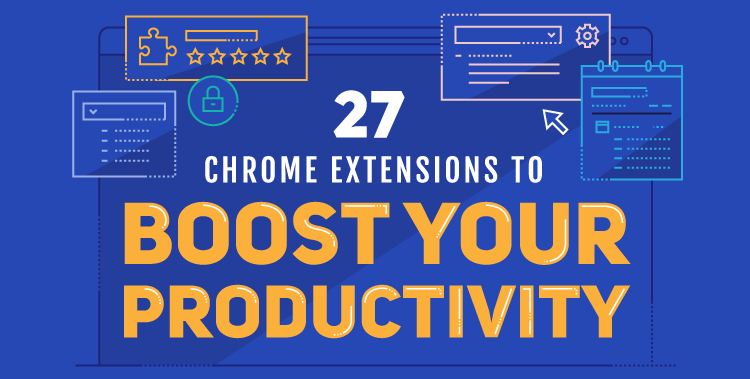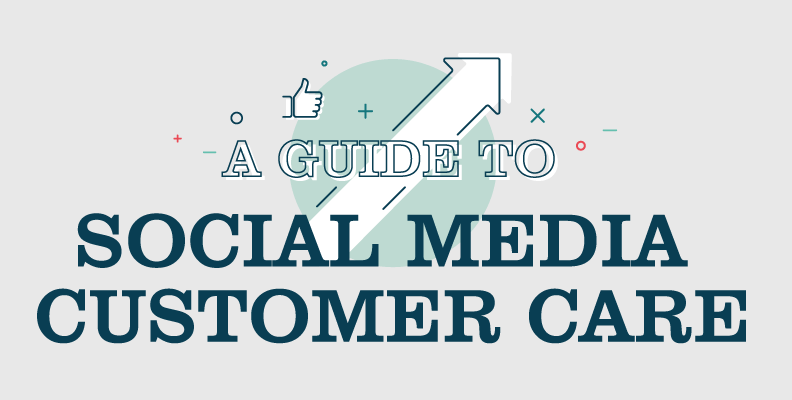27 Chrome Extensions to Boost Your Productivity
Disclaimer: This post was originally published on our UK partner’s site.
Google Chrome is far and away the most popular browser around and it supports a huge number of extensions, which are lightweight, easy-to-install, and usually free. Things you thought impossible to achieve with a browser become possible with these add-ons. And processes you never even imagined become easy work, as well. To help you find the best amongst the bunch we’ve created a handy visual guide.
For example, one of the greatest threats to productivity online is the constant influx of distractions. Every tab has something more interesting to offer than the one you’re working on! And the worst villain is email. Restricting your email checks to three dedicated sessions a day reduces stress and makes you feel more capable of completing work.
Inbox When Ready For Gmail automates this fresh approach for you, hiding your inbox and notifications even when you’re composing an email. Peace at last!
As long as you’re looking for quiet time among the bustle of the online world, how about Just Read? This browser extension transforms overly-ornate web design, and pages laden with ads, comments, and pop-ups, into a straightforward text presentation that you can… well, just read.
And let’s return to the subject of tabs. They’re great, right? Each open tab is there for a reason. That’s why you have 267 open tabs and you need a map to find the one you want.
But struggle with tabs no longer thanks to Session Buddy which can map your tabs by topic. It will save your open tabs so you can close down the ones you’re not using right now, free up precious memory, and reopen tabs when you need them. It also offers the functionality to search your tabs and export them to email, documents, or blog posts.
Your browser is a portal to a wild world of information, but with a suite of extensions that works for you it’s simple to tame it and boost your productivity. Scroll through our visual guide to find the ones that suit your needs and add them to your browser in just a couple of clicks.

Need to copy and paste something from the graphic above? Here’s the full text:
27 Chrome extensions to boost your productivity
Google Chrome remains the world’s most popular browser, with around 60% of internet users choosing it over its rivals.[1]
Part of its appeal is the wide range of extensions that are available to boost your browsing and increase your productivity, but only if you pick the right ones.
4 extensions to better manage your email
- Snooze Email
What it does: Snooze an email to temporarily remove it from your inbox and return at the time you set it.
- Why use it: In 2007, a group of Microsoft workers took, 15 minutes on average to return to serious mental tasks after dealing with incoming email.[2]
- Inbox When Ready For Gmail
What it does: Lets you schedule times when your inbox should be hidden so you can avoid distractions.
- Why use it: The University of British Columbia found that people who checked their email just three times per day, had lower stress levels and felt more able to complete their work.[3]
- Sortd For Gmail
What it does: Gives Gmail a task-board style layout making it easier to plan and prioritise emails and tasks.
- Why use it: A study by the University of California Santa Cruz showed people regularly wasted 10% of their total email time trying to arrange mail into respective folders.[4]
- Hiver
What it does: Enables collaboration on shared email accounts through notes, labels and assigned tasks.
- Why use it: A Stanford University study found that participants encouraged to work together persisted longer on a challenging task, enjoyed tasks more and performed better.[5]
4 extensions to keep you on track while browsing the web
- Just Read
What it does: Removes distractions like page styling, ads, pop-ups and comments, allowing you to focus on what you wanted to read.
- Why use it: A University of California study found that workers who get interrupted by external stimuli are significantly more likely to lose focus on the task at hand.[6]
- uBlock Origin
What it does: A content-filtering extension that blocks adverts and filters content on websites to keep them running quickly and efficiently.
- Why use it: 64% of responders to a HubSpot survey said they found internet ads to be ‘annoying and intrusive’ while 54% said they were ‘disruptive’.[7]
- Session Buddy
What it does: Helps you to save open tabs to access later, freeing up memory and removing clutter.
- Why use it: A 2014 study conducted at Stanford University showed multitasking can negatively affect your cognitive functioning and impede your productivity.[8]
- StayFocusd
What it does: Restricts the amount of time you can spend on time-wasting websites. Once your allotted time has been used up, the site will be inaccessible for the rest of the day.
- Why use it: In a survey by Salary.com, 64% of respondents said they visit non-work related websites every day during work hours.[9]
4 extensions for effective writing and note-taking
- Evernote Web Clipper
What it does: Lets you clip any article or page to a specific notebook and assign tags, highlight key sections, and share links.
- Why use it: Researchers at Utah State University found that information contained in notes, had a 34% chance of being remembered compared to 5% when not in notes.[10]
- Grammarly for Chrome
What it does: Detects spelling and grammar mistakes as well as contextual errors, misused homophones and more.
- Why use it: A study of ecommerce websites by entrepreneur Charles Duncombe found that in one case, a site’s revenue doubled when a prominent spelling error was corrected.[11]
- Writer
What it does: Allows you to write content like blog posts, reports, etc in a distraction-free environment in your browser as well as setting writing goals.
- Why use it: A Stanford University study found that people who regularly juggle several streams of content do not pay attention, memorise, or manage their tasks as well as those who focus on one thing at a time.[12]
- Google Keep – notes and lists
What it does: Captures notes, lists and photos as well as allowing you to record voice memos.
- Why use it: Memory expert Dr Cynthia Green says that list-making helps us because: “When we are organised we forget less and do more and generally are more effective and productive.”[13]
4 extensions to help you manage your tasks
- Momentum
What it does: Replaces your new tab page with a personalised dashboard offering a daily photo and an easy way of planning out your daily tasks.
- Why use it: A study published in the Journal of Experimental Psychology found that planning your next day’s activities helps you sleep better.[14]
- Todoist: To-Do list and Task Manager
What it does: An easy way to create task lists with reminders, allowing you to set due dates and even recurring dates.
- Why use it: A study by Wake Forest University showed that, while tasks we haven’t done distract us, just making a plan to get them done can free us from this anxiety.[15]
- Google Calendar
What it does: Gives you access to Google Calendar to add events without browsing away from your current webpage or opening a new tab.
- Why use it: Productivity guru Cal Newport recommends blocking out your time in a calendar, saying you can achieve as much in 40 hours as in 60 hours of unstructured work.[16]
- Toggl Button: Productivity & Time Tracker
What it does: Puts a timer into any web tool and allows quick real time productivity tracking along with a ‘Pomodoro’ timer that breaks your work into chunks.
- Why use it: A study by service automation experts AffinityLive found that businesses switching to frequent timesheet updates would recover $52,000 (£40,000) per person, per year in billable time.[17]
5 extensions to enable easier collaboration
- Ziteboard – zooming collaboration whiteboard
What it does: A zoomable realtime whiteboard for shared teamwork collaboration. Offering vector design, sketch drawing, shape recognition, tutoring and meeting tools.
- Why use it: A University of California Berkeley study found that organisations need to proactively encourage debate within groups to cultivate productive collaboration.[18]
- Save to Google Drive
What it does: Helps you save web content or screenshots to your team’s Google Drive by simply using the right-click menu.
- Why use it: Business insights specialists CEB found that the quality of knowledge-sharing within teams has more of an impact on productivity than new hires or the influence of managers.[19]
- Toby for Chrome
What it does: A tool for organising your browser tabs that lets you save tab groups, access them anywhere and share them with teams for easier collaboration.
- Why use it: A survey from CEB found that 60% of respondents said their day-to-day work requires regular coordination with 10 or more people.[19]
- Screenr
What it does: Captures a screenshot for you to annotate and share with your team, all from a side panel in Chrome.
- Why use it: According to a CEB survey, employees in teams that share knowledge are 2.5 times more likely to be encouraged to come up with new and better ways of working.[19]
- Annotator
What it does: Screenshot web pages and make notes to be used in presentations or demonstrations, or as instructions for developers or designers.
- Why use it: A study by Indiana University found that people following directions with visuals do 323% better than those following text directions alone.[20]
6 extensions for everything else
- LastPass: Free Password Manager
What it does: Saves your passwords and gives you secure access to the websites you need from every computer and mobile device.
- Why use it: A survey of 2,000 people in the U.S. and the U.K. found that companies lose over $430 (£330) in productivity per employee per year due to workers struggling with passwords.[21]
- Live Start Page – Living Wallpapers
What it does: As well as showing moving wallpapers on your Start Page and new tabs, you can set your main focus for the day and schedule mindfulness and meditation exercises.
- Why use it: Insurance giant Aetna found that, per person, mindfulness activities added roughly 60 minutes of productivity per week, worth about $3000 (£2,300) per year.[22]
- Typio Form Recovery
What it does: Automatically saves text as you type and lets you easily recover input data in case of loss due to connectivity issues.
- Why use it: A study by telecoms specialists Beaming, found that businesses lose an average of three days work due to connectivity outages every year.[23]
- Noisli
What it does: Plays a variety of white noise sounds to block out annoying noises and creates the right environment for working or relaxing.
Why use it: A study in the Journal of Consumer Research, found that a moderate level of ambient noise boosts creativity for most people.[24]
- Win the Day
What it does: Lets you set daily targets in your browser on your way towards achieving a big, overall goal.
- Why use it: During a University of Melbourne study, students were proven to learn up to 250% faster when difficult goals were set than when they were merely told “to do their best”.[25]
- Webtime Tracker
What it does: Keeps track of how you spend time on the web and presents the stats in a useful and intuitive way.
- Why use it: A Microsoft survey found most workers are only productive for 60% of the time, so a time tracker can help you identify where you can make improvements to your productivity.[26]
All of these extensions can help you make a huge difference to your productivity and adding them is as simple as a few clicks. So, why not try out a few and see how much more productive you can be.
Sources
- Stat Counter. (2018). Browser Market Share Worldwide. statcounter.com
- Ibal, S. T., Horvitz, E. (2007). Disruption and Recovery of Computing Tasks: Field Study, Analysis, and Directions. erichorvitz.com
- Kushlev, K., Dunn, E.W. (2015). Checking email less frequently reduces stress. Computers in Human Behavior Volume 43
- Whittaker, S. Matthews, T. et al. (2011). Am I wasting my time organizing email? A study of email refinding. ucsc.edu
- Carr, P.B., Walton, G.M. (2014). Cues of working together fuel intrinsic motivation. Journal of Experimental Social Psychology Volume 53
- Mark, G. (2015). Multitasking in the Digital Age. morganclaypool.com
- An, M. (2016). Why People Block Ads (And What It Means for Marketers and Advertisers). hubspot.com
- Gorlick, A. (2009). Media multitaskers pay mental price, Stanford study shows. stanford.edu
- Salary.com. (2018). Why & How Your Employees are Wasting Time at Work. salary.com
- Utah State University. (2018). Effective Note Taking Strategies. usu.edu
- Coughlan, S. (2011). Spelling mistakes ‘cost millions’ in lost online sales. bbc.co.uk
- Ophir, E., Nass, C., Wagner, A.D. (2009). Cognitive control in media multitaskers. ncbi.nlm.nih.gov
- Green, C.R. (2011). List Making Will Save Your Brain listproducer.com
- Scullin, M. K., Krueger, M. L., et al. (2018). The effects of bedtime writing on difficulty falling asleep: A polysomnographic study comparing to-do lists and completed activity lists. Journal of Experimental Psychology
- Masicampo, E. J., & Baumeister, R. F. (2011). Consider It Done! Plan Making Can
Eliminate the Cognitive Effects of Unfulfilled Goals. Journal of Personality and Social
Psychology - Newport, C. (2013). Deep Habits: The Importance of Planning Every Minute of Your Work Day. calnewport.com
- AffinityLive. (2015). Time Is Money: A Revealing Study Into The Cost of Today’s Poor Time Tracking Technology & Habits. accelo.com
- Kelly, K., Schafer, A. (2014). Creating a Collaborative Organizational Culture. kenan-flagler.unc.edu
- CEB. (2013). Driving the Strategic Agenda in the New Work Environment. cebglobal.com
- Levie, W.H., Lentz, R. (1982). Effects of text illustrations: A review of research. ECTJ
- Centrify. (2014). Centrify Survey Results. centrify.com
- Gelles, D. (2015). At Aetna, a C.E.O.’s Management by Mantra. nytimes.com
- White, R. (2017). Internet downtime cost British businesses £7 billion in 2016. beaming.co.uk
- Mehta, R., Zhu, R., Cheema, A. (2012). Is Noise Always Bad? Exploring the Effects of Ambient Noise on Creative Cognition. Journal of Consumer Research Vol. 39
- Hattie, J., Yates, G.C.R. (2013). Visible learning and the science of how we learn. researchgate.net
- Microsoft. (2005). Survey Finds Workers Average Only Three Productive Days per Week. microsoft.com
Embed This Image On Your Site (copy code below):






